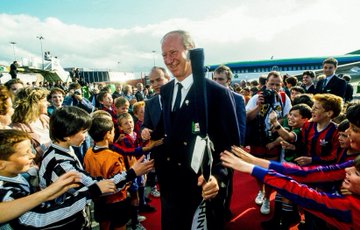Big Jack
0June 1988. I was 11 years old and still basking in Wimbledon’s FA Cup Final victory the month before. Now it was time for the European Championships, but with a twist; the Republic of Ireland had qualified for their first major football tournament. With Mum being from Northern Ireland, I’d followed Billy Bingham’s squads at the 1982 & 1986 World Cups, but now it was Dad’s turn to see his countrymen go up against the big boys.
This was, at the time, an eight team tournament; the absolute elite of European football. Very difficult to qualify for and a ruthless tournament set-up with two groups of four. The Republic had England, the Soviet Union and the Netherlands. Lambs to the slaughter it seemed.
In charge of them was a man with big tournament pedigree, but as a player, rather than a manager. Jack Charlton was appointed in December 1985, having resigned from Newcastle United a few months earlier. Prior to that, his unremarkable managerial career had started at Middlesbrough in 1973 and he’d also had a spell in charge of Sheffield Wednesday.
A member of England’s 1966 World Cup winning team, alongside his younger brother Bobby, Jack always recalled the words of their manager Sir Alf Ramsey when he asked why he had been chosen to play for his country ahead of younger, more skilled players:
‘Jack, you must understand that my job is not to pick necessarily the best players. Oh no, my job is to select players I believe will be best able to form an effective team. This job is about making a team and that’s the only way we are going to win the World Cup.’
Jack’s playing career that led to this England debut started back in 1952, when, at the age of seventeen, he signed a professional contract at Leeds United. He was the oldest of four brothers from a town called Ashington, about 15 miles north of Newcastle. His father Bob was a hard working miner and it was his mother Cissie who brought Jack and his brothers along to watch Newcastle United at St James Park. Despite their devotion to the Toon Army however, it was Leeds that came calling, where Jack amassed 629 first team appearances between his debut in 1953 and his final match in 1973. Leeds won all the domestic trophies during that period, along with two European Fairs Cups in 1968 and 1971. His England debut came in 1965 and he won 35 caps in total between then and 1970, largely playing alongside Bobby Moore in the centre of defence. Jack was also 1967’s English Player of the Year.
Back to the 1988 European Championships and the Republic’s first group match was against England. Charlton had assembled a team of winners, of fighters. They didn’t all have Irish accents, far from it. But those players, such as Ray Houghton, Mick McCarthy and John Aldridge would give their all and that’s what mattered to Jack. He had to ignore the criticism of fans who longed for an attractive style of football and a ‘pure’ Irish XI. What mattered to Jack was results and getting every ounce of effort and talent out of those he did pick. I don’t remember many complains when they beat England 1-0 that sunny afternoon in Stuttgart.
They would go on to finish third in their group, after a 1-1 draw with the Soviet Union and a 1-0 loss to the eventual tournament winners, the Netherlands. They had done their nation proud. He would go on to lead them to the World Cups in 1990 and 1994 before resigning in late 1995 after they failed to qualify for Euro 1996. In 1996, he was awarded honorary Irish Citizenship.
From that time until his death, he stayed out of the limelight, but was fondly remembered by Leeds, England and Ireland fans. His success was built on making the most of his talent through hard work and implementing systems that allowed others to do the same. He’ll be missed. Rest in Peace up there ‘Big Jack.’
Follow Aiden on Twitter

